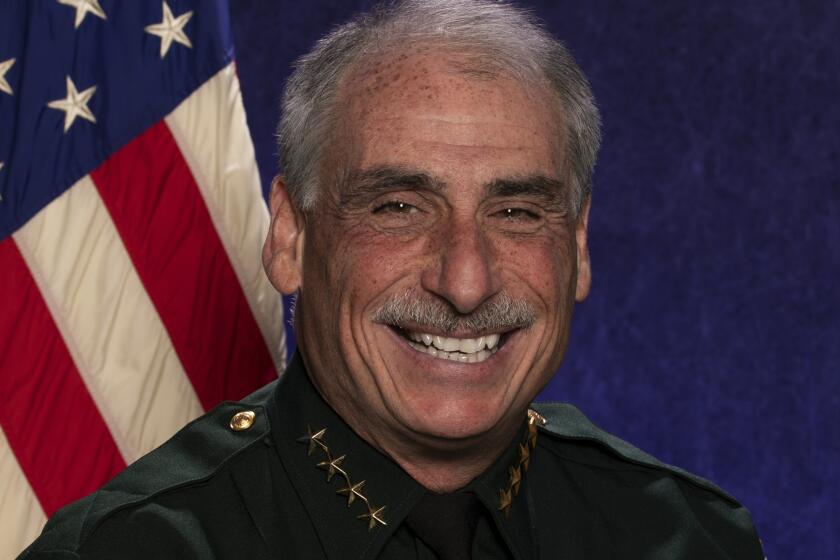Afghanistan OKs creation of security forces for remote areas
Under pressure from Army Gen. David H. Petraeus, the Afghan government on Wednesday authorized the creation of additional local security forces as a stopgap measure for rural areas where the Taliban remains strong, U.S. defense officials said.
The move comes after more than a week of talks between Petraeus and Afghan President Hamid Karzai, who initially opposed the idea of creating new village security forces, fearing the units could turn into militias beyond the government’s control.
Petraeus overcame deep reservations by Karzai and some of his advisors with assurances that the forces would be temporary and under the control of the Afghan Interior Ministry, which would pay their salaries, the officials said.
“These would be government-formed, government-paid, government-uniformed local police units,” Pentagon spokesman Geoff Morrell said at a briefing Wednesday. They “would keep an eye out for bad guys in their neighborhoods, in their communities” and “work with the Afghan police forces and Afghan army.”
A statement issued Wednesday by the Afghan National Security Council said Karzai had chaired a meeting on the policing plan and that “several aspects” had been decided, including putting the new security forces under the Interior Ministry’s control. The statement said details of the program would be available later.
The decision is an early indication of how Petraeus intends to try to turn around the worsening violence in Afghanistan and seems to borrow, at least in broad terms, from the blueprint he employed as commander in Iraq, where he embraced the idea of hiring large numbers of Sunnis as militia forces.
But even U.S. officials acknowledged that the idea of paying Afghans with little training to patrol their villages is a risky one in a country with a long tradition of warlordism and corruption — and an intensifying insurgency.
The effort in Afghanistan is likely to be smaller than it was in Iraq and more focused on remote rural areas, where there is worsening security and insufficient NATO and Afghan troops, according to a senior U.S. military official in Afghanistan.
The initial focus will be on building village defense units in southern Afghanistan, where the Taliban is strongest, he said, speaking on condition of anonymity.
“Clearly we need to apply much of this capability in the south,” he said. “But we’ll need to look at applying it up in the north and west as well,” in provinces such as Kunduz, Baghlan and Badghis, where security has been worsening in some areas and troops are scarce.
Unlike the militias backed by Petraeus in Iraq, there is no plan to incorporate the men who join the new units permanently into the Afghan security forces, the officials said. The village defense forces are “a temporary solution to a very real near-term problem,” Morrell said.
He added, “We simply do not have the manpower to provide as much security to as many areas as we would like.”
The U.S. has attempted to create local defense units several times already, and one pilot program in fewer than a dozen villages was begun under Petraeus’ predecessor, Army Gen. Stanley A. McChrystal. But past efforts have run into numerous problems, including instances in which units, rather than protect their areas, began demanding bribes and imposing taxes on residents. Other units fell apart when they came under insurgent attacks.
Those efforts, the officials said, had few direct links to the central government in Kabul.
Whether the Interior Ministry, with help from the North Atlantic Treaty Organization, can prevent such problems from recurring is unclear. The units will have relatively little training, officials said. But by giving the forces responsibility only for protecting their own homes and villages, it is hoped they will form a first line of defense against the Taliban.
The offer of a regular salary is likely to draw many recruits in impoverished areas, but it also could create opportunities for corruption in a society where the problem persists.
Facing the need to show progress by the end of the year, when President Obama has said he will review Afghan efforts, Petraeus has quickly embraced ad hoc forces to supplement the Afghan army and police that NATO is also training.
“This is about putting locals to work,” Morrell said, “so that they can be on watch in their communities, for people who shouldn’t be there.”
More to Read
Sign up for Essential California
The most important California stories and recommendations in your inbox every morning.
You may occasionally receive promotional content from the Los Angeles Times.











